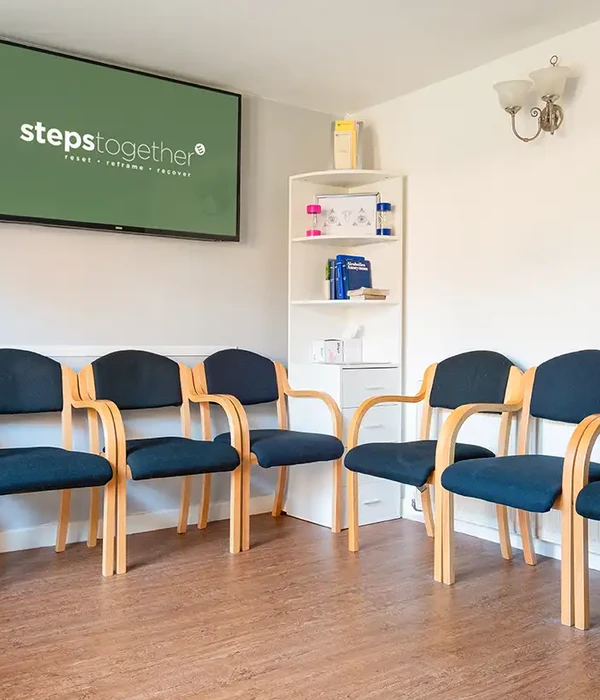Alcohol Addiction Treatment
Alcohol addiction affects many people. If you struggle with this condition, you might feel like stopping is impossible, but you are not alone, and help is available. Effective alcohol addiction treatment exists and can help you take control and improve your quality of life.
You can find a range of treatment options to suit your needs, including counselling, group support, and medical care. Recognising when it is time to seek help is an important first step towards recovery.

Take the First Step Towards Recovery
Steps Together offers personalised support and proven treatments, providing the care, guidance and encouragement you need to move forward with confidence and build a healthier future.

Understanding Alcohol Use Disorder
Alcohol addiction can affect almost every aspect of your life, including your physical health, mental well-being, relationships, and day-to-day responsibilities. Understanding the difference between casual drinking, alcohol misuse, and addiction is key to recognising when alcohol use becomes a problem and when to seek alcohol addiction treatment.
Casual drinking is typically moderate and controlled, while misuse involves patterns that may lead to harm. Addiction, or alcohol use disorder, involves a loss of control and continued use despite negative consequences. Early recognition of warning signs allows for timely support and intervention.
What Constitutes Alcohol Addiction?
Alcohol addiction, also known as Alcohol Use Disorder (AUD), is a condition in which alcohol use causes harm or distress. If you misuse alcohol, you may drink heavily or binge drink, which raises your risk of developing AUD.
Heavy drinking often means drinking more than 14 units of alcohol a week for men or more than 7 units for women. Binge drinking is drinking a large amount in a short time, raising the risk of accidents and other issues. Alcohol misuse can start with occasional heavy drinking, but over time, it can turn into dependence or addiction.


Physical and Mental Health Consequences
Alcohol addiction affects your body and mind in many ways. Regular heavy drinking can damage your liver, heart, and stomach. It can raise your chances of getting cancers, especially in the mouth, throat, and liver.
Long-term alcohol use also affects your brain and can change the way you think, feel, and act. You may notice problems with memory, decision-making, or learning. Many people with alcohol dependence also experience depression, anxiety, or mood swings.
Alcohol Addiction Treatment Options
Treating alcohol addiction involves several important steps and choices. Successful recovery often requires structured support, medical care, and different therapies to address both the physical and psychological effects of alcohol dependence.
Alcohol Detox
Alcohol detox is the first stage of treatment for those who are physically dependent on alcohol. You may experience withdrawal symptoms when you suddenly stop drinking. These can range from mild anxiety to severe complications like seizures.
Supervised detox is usually recommended, especially if you have a long history of heavy drinking or past complications. Medical staff may monitor your vital signs, offer fluids, and in some cases, provide medications to reduce discomfort and prevent serious problems. Staying in a safe environment during detox can lower your risk of health complications.
Therapeutic Approaches
Different types of therapy are used in an alcohol addiction treatment programme. Cognitive behavioural therapy (CBT) is often recommended because it helps you recognise negative thought patterns and behaviours connected to alcohol use. CBT teaches coping skills and offers support to manage alcohol cravings.
Another approach that can be used is Dialectical Behaviour Therapy (DBT). This can help you learn how to regulate your emotions so that you don’t turn to alcohol as a means of coping with strong emotions.
Residential Alcohol Treatment
Residential alcohol treatment, also called inpatient treatment or rehab, involves staying at a facility where you receive structured care and supervision. You benefit from a daily schedule that may include therapy, medical monitoring, and opportunities for group support.
Residential treatment is beneficial if you have tried to stop drinking before and relapsed, or if you need help with other mental health conditions at the same time. In a treatment centre, you are removed from triggers or environments that could encourage drinking.
Medications Available for Alcohol Dependency
Medications can also support your recovery from alcohol addiction. Some medicines help reduce cravings, while others make it less likely you will drink by causing unpleasant effects if you consume alcohol.
Examples include disulfiram, which creates nausea if you drink, and acamprosate, which balances chemicals in the brain affected by alcohol. Another option, naltrexone, blocks the pleasurable effects of alcohol. These medicines can be used along with therapy and support groups.
Services that our multi-speciality addiction rehabilitation centres offer

Recognising Alcohol Abuse
Recognising alcohol addiction early is key to getting the right treatment and preventing serious physical and mental health issues. Important steps include being aware of common symptoms such as increased tolerance to alcohol, drinking in secret, or neglecting responsibilities.
Understanding cravings, withdrawal symptoms, and how alcohol affects brain chemistry can help you identify when drinking has become a problem. Exploring intervention strategies and support options, like therapy, support groups, or detox programmes, can lead to timely help and improve the chances of lasting recovery.
Warning Signs
You may notice several warning signs if you or someone you know is struggling with alcohol addiction. These signs can be both physical and behavioural. Some common signs include drinking more or for longer than planned, having trouble reducing or stopping alcohol consumption, or spending a lot of time drinking, getting alcohol, or recovering from its effects
Craving is a strong desire or urge to drink alcohol. You might feel like you cannot stop thinking about drinking, or feel restless when you are unable to drink. Cravings are common in alcohol use disorder and can make quitting difficult.

Support Systems During Alcohol Rehab
Family members and close friends can provide you with daily encouragement and emotional support. When your family is involved, you may feel less isolated and more likely to seek help when you need it. Open communication with loved ones can also reduce misunderstandings and rebuild trust after addiction.
Support groups, such as Alcoholics Anonymous (AA), use a 12-step approach to help people recover from alcohol misuse by promoting honesty, connection, and taking responsibility for their actions. These groups provide a space for you to connect with others who understand your journey. They also provide structure, regular meetings, and a sense of belonging. You can share experiences, discuss setbacks, and celebrate successes together.
You can see a counsellor to help support you in your recovery. One-to-one counselling sessions give you a safe space where you can discuss your feelings, challenges, and accomplishments. You can also develop healthy coping skills to continue to manage your cravings.
Ongoing Challenges in Rehab Treatment
Recovery from alcohol addiction is an ongoing process marked by both progress and setbacks. You may face obstacles like relapse, co-occurring mental health conditions, and changes in treatment methods that impact your long-term results.
Relapse Risk
Relapse is a major challenge after alcohol addiction treatment. Even with effective care, many people struggle to maintain sobriety because triggers and cravings can reappear during stressful periods.
Being part of a structured aftercare plan with ongoing support, such as outpatient treatment or support groups, can help you build coping skills and stay accountable. Relapse can be common with alcohol, thanks in part to how freely available it is.
Co-Occurring Disorders and Substance Use
Many people dealing with alcohol addiction also face mental health issues. You might experience anxiety, depression, or trauma, which can complicate both diagnosis and recovery. Effective treatment must address both substance use and any co-occurring mental health conditions to support lasting results.
You may also struggle with other substances, such as cocaine, which increases relapse risk and can impact your health further. Treating both conditions simultaneously, sometimes referred to as integrated care, helps simplify your recovery journey. It can also make your weight loss or physical wellness goals more achievable if you are working on overall health.
Maintaining Sobriety
Long-term sobriety improves when you stay engaged in aftercare programmes, as they offer ongoing guidance and support for day-to-day challenges. Aftercare can involve group counselling, relapse prevention training, regular check-ins, or involving family members in your recovery process.
These services help reinforce healthy coping mechanisms and provide a safety net as you adjust to life after rehab treatment. Recognising the early warning signs of relapse and taking prompt action can play a vital role in maintaining your progress and reducing the risk of returning to old habits.

Our Rehab Centre Can Help You Heal
Alcohol addiction can have serious physical, emotional, and social consequences and affect nearly every facet of your life. However, with the right support and professional treatment for alcohol use, recovery is possible. With guidance and commitment, we can help you take the first steps toward long-term recovery and a healthier future.
At Steps Together, we offer structured, personalised alcohol addiction treatment plans designed to meet your specific needs. Our compassionate team works with you or your loved one to provide therapy, medical care, and practical strategies for lasting change.
Frequently Asked Questions
What are the most effective therapies for treating alcohol dependence?
Cognitive behavioural therapy is a widely used treatment approach and helps you learn new ways to cope without alcohol. Motivational interviewing is another approach that encourages you to identify the reasons behind your decision to stop drinking.
Can alcohol addiction be cured, or is it a lifelong condition?
There is no simple cure for alcohol addiction. Staying sober often means ongoing support and treatment even after the main rehab is complete. Some people do stop drinking fully and stay sober for years, while others may have setbacks or relapses.
Which medications are commonly prescribed for alcohol withdrawal symptoms?
Doctors may prescribe medicines like benzodiazepines to ease withdrawal and prevent complications. Other drugs, such as acamprosate or disulfiram, may be used after detox to help prevent drinking.
How long does a typical alcohol rehabilitation programme last?
The length of rehabilitation depends on your needs and the severity of your alcohol dependence. Many detox programmes take 1 to 2 weeks, but full rehabilitation may last several weeks or months.
What should one expect during the detoxification process?
Detox is the first step to stop drinking safely. You may experience withdrawal symptoms, which can include sweating, shaking, anxiety, and trouble sleeping. For some, withdrawal can be severe, and medical supervision will be needed.
How does one support a family member through their addiction recovery journey?
Offering understanding and patience is essential. Encourage your loved one to attend counselling, take prescribed medication, and join support groups. You might also benefit from family therapy to deal with the changes recovery brings.





